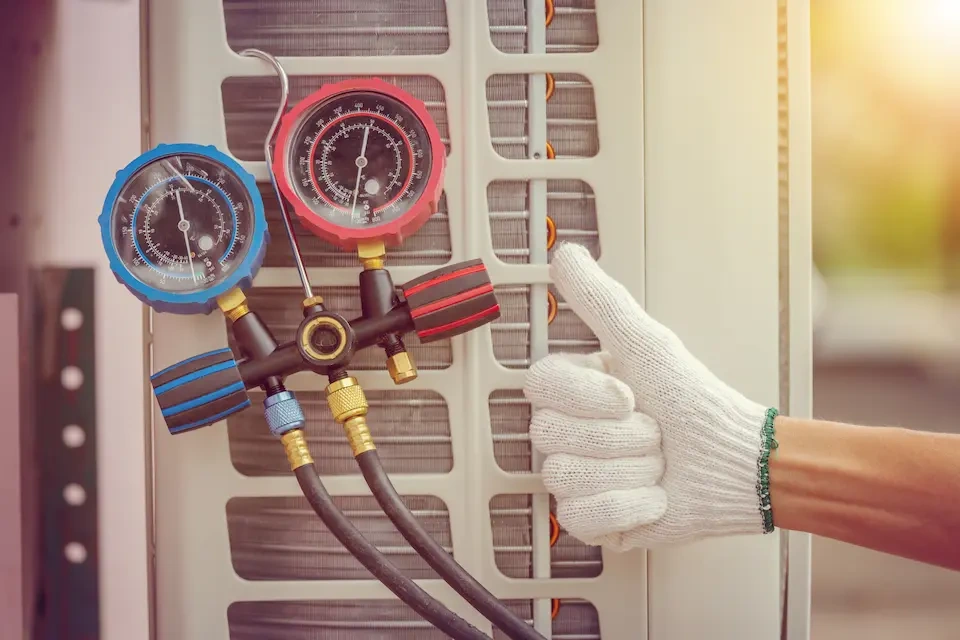October 16, 2023
Heat Pump vs Furnace: A Comprehensive Guide

In the ever-evolving world of home heating and comfort, choosing the right HVAC system can feel like navigating a maze of options. Heat pumps and furnaces are two prominent contenders, each with its own set of advantages and considerations. As the seasons change and your energy bills fluctuate, the decision between a traditional heat pump, a gas furnace, or a geothermal heat pump becomes increasingly vital.
That’s why our Raleigh heating and cooling professionals are unraveling the intricacies of heat pumps vs gas furnaces, exploring their strengths, weaknesses, energy efficiency, environmental impact, and much more. By the end of this journey, you’ll be well-equipped to make an informed choice that ensures warmth, comfort, and savings for your home.
Understanding Heating Systems
When it comes to keeping your home warm during those chilly North Carolina winters, understanding heating systems is essential to make the best choice between heat pump systems vs furnaces.
Heat Pump System
Heat pumps are remarkable devices that offer both heating and cooling functions. Unlike traditional heating systems, which generate heat, ground-source heat pumps transfer heat from one place to another. Heat pump technology works on the principle of extracting heat from the Earth and transferring it indoors to heat your home. This innovative approach makes heat pumps highly efficient and environmentally friendly.
Furnaces
Furnaces, on the other hand, are more traditional heating systems compared to a heat pump system. They generate heat by burning fuel, such as natural gas or propane, or by using electricity. This heat is then distributed throughout your home via ductwork and vents. Furnaces are known for their reliability and quick heating capabilities.
How Heat Pump vs Furnace Systems Work
To make an informed decision about your heating system, it’s crucial to understand how a heat pump vs furnace operates.
Heat pumps use a refrigeration cycle to absorb heat from the outside air, even when it feels cold. They then use a compressor to increase the temperature of this heat and circulate it through your home. In the summer, they reverse this process to provide cooling.
Furnaces burn fuel or use electric resistance heating elements to generate heat. A blower fan then pushes this warm air through the ducts, distributing it to different rooms. Furnaces maintain your desired temperature by turning on and off as needed.
Factors to Consider When Selecting a Home Heating System
Now that you have a basic understanding of these heating systems, it’s time to explore the factors that should influence your decision:
- Climate: Raleigh’s climate features both cold winters and hot summers. Consider whether asystem can efficiently handle both heating and cooling to maximize year-round comfort.
- Energy Efficiency: Evaluate the energy efficiency ratings of a heat pump vs furnace. Understanding these ratings will help you determine which system will be more cost-effective in the long run.
- Environmental Impact: Think about the environmental impact of your choice. Heat pumps are often considered more eco-friendly due to their efficient heat transfer process.
- Initial Cost: Budget constraints are a significant factor. Heat pumps may have a higher upfront cost, but lower operational expenses, while furnaces tend to be more affordable initially but may cost more to run.
- Maintenance and Lifespan: Consider the maintenance requirements and expected lifespan of each system. Proper preventative maintenance can extend the life of your heating system and optimize its performance.
The Pros and Cons of Heat Pumps
A heat pump is a heating and cooling system that operates on the principle of transferring heat from one location to another. It can extract heat from the outdoor air, even in cold temperatures, and efficiently heat or cool indoor spaces.
Advantages of Heat Pumps
There are numerous heat pump advantages that make them an attractive choice for those seeking year-round comfort, energy savings, and environmental benefits. Some of these benefits include:
- Energy Efficiency: Unlike traditional heating systems that generate heat, heat pumps simply move it from one place to another. This process consumes significantly less energy, making them cost-effective and environmentally friendly.
- Versatility: Heat pumps are versatile systems that can both heat and cool your home. This versatility means you can use them year-round, maintaining a comfortable temperature in all seasons without the need for a separate air conditioner.
- Environmental Benefits: Heat pumps have a lower carbon footprint compared to furnaces because they rely on electricity to move heat rather than burning fossil fuels. This makes them an eco-friendly choice, contributing to a greener future.
Drawbacks of Heat Pumps
While heat pumps offer a range of benefits, it’s important to consider the potential drawbacks associated with this heating and cooling technology, including:
- Cold Weather Limitations: While heat pumps work efficiently in milder climates like Raleigh, they can struggle in extremely cold weather. As temperatures drop, the heat pump’s ability to extract heat from the outdoor air diminishes, potentially leading to reduced heating capacity.
- Initial Cost: Heat pumps generally have a higher upfront cost compared to traditional furnaces. However, their long-term energy savings may offset this initial expense.
The Pros and Cons of Furnaces
A furnace is a heating system that generates heat by burning fuel (such as natural gas or propane) or by using electric resistance heating elements. It then distributes the warm air throughout your home via ductwork and vents.
Advantages of Furnaces
Furnaces have long been a reliable choice for heating homes, and their enduring popularity is not without reason, as furnaces offer some significant advantages, such as:
- Reliable in Cold Climates: Furnaces are known for their reliability, particularly in extremely cold climates. They can deliver consistent and comfortable heating, even when outdoor temperatures plummet.
- Quick Heating: Furnaces are capable of rapid heating. They can quickly raise the indoor temperature to your desired level, providing near-instant comfort when needed.
Drawbacks of Furnaces
As with any heating system, furnaces come with their own set of drawbacks that should be carefully considered when making a heating choice between a heat pump vs furnace. These include:
- Lower Energy Efficiency: Furnaces are typically less energy-efficient than heat pumps because they generate heat by burning fuel or using electric resistance. This can result in higher energy bills, especially during the winter months.
- Limited Cooling Capabilities: Unlike heat pumps, furnaces are primarily designed for heating and lack cooling capabilities. To cool your home, you would need a separate air conditioning system.
Energy Efficiency and Environmental Impact of a Heat Pump vs Furnace
Understanding the critical factors that contribute toward energy efficiency and environmental impact is essential for making a well-informed decision about whether to opt for a heat pump or a furnace for your Raleigh home.
Energy Efficiency of Heat Pumps vs Furnaces
Heat pumps are renowned for their exceptional energy efficiency. They typically have higher Seasonal Energy Efficiency Ratio (SEER) and Heating Seasonal Performance Factor (HSPF) ratings compared to furnaces. These ratings indicate how efficiently a system heats or cools your home.
Furnaces, especially those powered by natural gas or propane, tend to be less energy-efficient than heat pumps. They have lower Annual Fuel Utilization Efficiency (AFUE) ratings, which measure how efficiently they convert fuel into heat. Electric furnaces may have higher efficiency but can still be less efficient than heat pumps.
Environmental Considerations of Heat Pumps vs Furnaces
The environmental impact of your heating system is a crucial consideration. Heat pumps generally have a lower carbon footprint compared to furnaces because they don’t burn fossil fuels. Instead, they rely on electricity to move heat, which can be sourced from renewable energy.
Consider the source of energy for your heating system. If your electricity comes from renewable sources like wind or solar, the environmental impact of a heat pump becomes even lower. In contrast, furnaces that rely on natural gas or oil contribute to carbon emissions and are less environmentally friendly.

Making the Decision Between a Heat Pump vs Furnace
As you approach the critical juncture of choosing between a heat pump vs furnace for your Raleigh home, it’s essential to consider various factors, seek expert guidance from skilled HVAC professionals, and receive customized recommendations to ensure the perfect fit for your specific needs.
When faced with the decision between a heat pump and a furnace, it’s often beneficial to consult with experts who understand the intricacies of HVAC systems and the unique needs of your home.
Bowman Mechanical Services offers expert advice in the following ways:
- In-Depth Assessment: Our technicians will conduct a thorough assessment of your home, taking into account its size, layout, insulation, and existing infrastructure.
- Climate Considerations: We understand the local climate in Raleigh and how it affects your heating and cooling requirements, helping you make an informed decision.
- Budget Alignment: We’ll work with you to ensure that your choice aligns with your budget and long-term financial goals.
- Sustainability: If environmental sustainability is a priority, we can discuss options for energy-efficient and eco-friendly solutions.
- Customized Solutions: Our experts will provide you with customized recommendations based on your unique needs and preferences.
At Bowman Mechanical Services, we understand that one size does not fit all when it comes to heat pump vs furnace heating systems. We offer customized recommendations tailored to your specific needs, taking into account factors such as:
- Your home’s size and layout.
- Climate considerations.
- Your budget and financial goals.
- Energy efficiency preferences.
- Environmental priorities.
- Existing infrastructure and compatibility.
Our goal is to ensure that the heating system you choose provides you with optimal comfort, efficiency, and peace of mind for years to come.
Contact Our Heat Pump Experts in Raleigh Today
Ready to take the next step in achieving ultimate comfort and efficiency in your Raleigh home? Contact our professional HVAC contractors today. Our team at Bowman Mechanical Services is dedicated to providing top-notch heating and cooling solutions tailored to your needs.
Don’t wait another season to optimize your HVAC system. Whether you’re looking for expert advice, installation, HVAC inspection, or emergency repairs, our experienced technicians are here to assist you.
Contact us now to schedule a consultation or service in or around the Raleigh area by calling us at [phone] or filling out the contact form below to get started.

